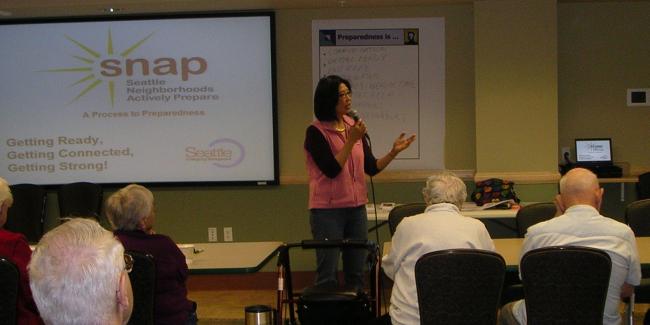21st Century Viking: Being prepared could save your life and others
Debbie Goetz, with Seattle's Office of Emergency Management, addresses a group at the first Ballard Prepared meeting on April 25.
Fri, 05/15/2009
On April 25, I attended the first meeting of Central Ballard Prepared, held at the Ballard Landmark on Leary Way, to better prepare residents in the area for survival if disaster were to strike.
The purpose of this meeting was to begin the process of creating an emergency preparedness group for central Ballard (that area being defined by the city as bounded by Northwest 65th Street, to 11th Avenue Northwest to the east, Shilsole Avenue to the south and 28th Avenue Northwest to the west).
The group got off to a good start by choosing Ballard Commons Park as a location for people to gather after a disaster. Attending the meeting really made me think, not only about my own level of preparedness, but about the needs of more vulnerable members of the community during a disaster and what I can do to help.
The meeting was led by Debbie Goetz of the Seattle Office of Emergency Management with assistance from Martin Qualters, representing Ballard House and SHARP (Seattle Housing Authority Residents Prepared). Among those in attendance Rob Mattson, Ballard's Neighborhood District Coordinator, Thomas Wittemore from the Department of Neighborhoods, as well as nearly 20 residents of local senior living centers.
Linda Lou Larsen, the former director of vitality at Ballard Landmark arranged the meeting space.
The meeting opened with introductions followed by Goetz asking the attendees what they thought it means to be prepared for an emergency. Among the topics that were touched upon were communication, getting ready, having an exit route, having food, water and medicine and knowing their neighbors.
As Qualters said, “If I’m not prepared, I’m going to be part of the problem. I want to be part of the solution.”
The group also went over their worries during an emergency situation. The list included concerns about mobility, medication, and where to go if they needed to evacuate. The theme that Goetz heard from the group was “It’s going to take a connection with others.”
Goetz then discussed the levels of preparedness. You need to start with personal and family preparedness, then on a neighborhood level, then a community level before you can consider yourself disaster ready.
The secret to becoming disaster ready, Goetz said, was “finding the path that fits your group best.” Some of the seniors who were trying to actively prepare in their buildings told the group how they encountered not only resistance from the other residents but from the building managers.
One of the most important things that a neighborhood needs in an emergency is a communication hub, a meeting place where people can give and get information, Goetz said. The group determined that in an emergency that Ballard Commons Park would be the place to gather after a disaster, with Bergen Place Park as a staging area for the Ballard Landmark residents.
The meeting was informative on several levels. Debbie Goetz gave a great presentation on preparedness that she or anyone from SNAP (Seattle Neighborhoods Actively Prepared) is willing to give to an interested neighborhood group. If you are interested in more information about this presentation or for more information on preparedness, please go to the SNAP Web site.
It was also quite informative to see the issue of preparedness from a completely different perspective than my own. The senior community has a lot more at stake if there is a widespread disruption of our day-to-day lives.
It really bothered me when I heard that the seniors who were trying to take responsibility for their own situation and their communities were meeting such resistance from the people who should be helping them.
The meeting also made me aware of the importance of not only making sure that I am prepared but that the more vulnerable members of our community are taken care of during an emergency.
As a young and active person, there is a lot that I can do. I am working toward getting a ham radio license so I can communicate during an emergency.
My hope is that people begin to think about what you could do to help in an emergency. If you’re interested in working with Central Ballard Prepared, get in touch with me. If you’re interested in starting a group in your neighborhood, let me know.
If you’re interested in talking more about preparedness in general, let me know. Now is the time to do something before its too late.


